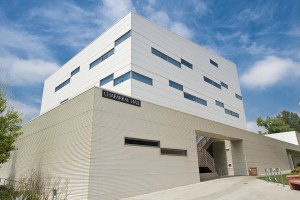CSUN Selected to Participate in New National Effort to Develop More Inclusive and Diverse STEM Faculty

Chaparral Hall, CSUN’s home for science and math studies. File photo by Lee Choo.
California State University, Northridge is one of 15 public research universities chosen for a new initiative to improve practices for recruiting, hiring and retaining underrepresented groups in science, technology, engineering and math (STEM) fields. The initiative, led by the Association of Public and Land-grant Universities (APLU) and the Center for the Integration of Research, Teaching and Learning (CIRTL), based at the University of Wisconsin-Madison, is also aimed at ensuring all STEM faculty utilize inclusive teaching practices.
This spring, CSUN was named to the first cohort of universities that will work to increase the diversity of the STEM professoriate. CSUN will begin with a self-assessment of its current practices and resources. The university will develop and implement an action plan and map ways to scale such efforts across all STEM programs.
Data from the National Science Foundation (NSF) shows that when underrepresented students are taught by diverse faculty members they achieve at significantly higher rates; as much as 20-50 percent of the course achievement gaps between underserved and better-served students are eliminated.
“CSUN has long made it a priority to have a faculty that reflects the diversity of our region and our student population,” said CSUN President Dianne F. Harrison. “By recruiting and retaining faculty members who are traditionally underrepresented in higher education, we encourage improved student success, as students are exposed to faculty who bring diverse perspectives and lived experiences. With this new initiative, CSUN will be able to identify additional strategies for promoting diversity and inclusive excellence in our faculty and on our campus.”
The national diversity program, known as “Aspire: The National Alliance for Inclusive and Diverse STEM Faculty,” is funded by the NSF as part of a broader effort known as NSF INCLUDES (Inclusion across the Nation of Communities of Learners of Underrepresented Discoverers in Engineering and Science). Notable schools in CSUN’s cohort include UC Irvine, the University of Oregon and Florida State University. The Aspire Alliance intends to grow this new institutional change effort and select 50 additional universities as part of two additional cohorts over the next two years.
The Aspire Alliance is using this initial cohort to launch a program it calls the “IChange Network.” The IChange Network will provide participating institutions with comprehensive support and resources for institutional change. The network also will provide access to an APLU-developed institutional self-assessment for inclusive faculty hiring, a leadership institute to assist with professional development for existing faculty from underrepresented groups and a competitive funding program to foster new campus-based initiatives to diversify the STEM faculty.
“CSUN is lauded for its inclusive educational environment, and we recognize the immense value that diversity brings to research, scholarship and workforce development,” said Natalie Mason-Kinsey, chief diversity officer at CSUN. “CSUN is committed to achieving excellence through teaching, scholarship, learning and inclusion. Our participation in the first cohort of the IChange Network will enable us to share our best practices, while also being able to examine the best practices of others — to put together a strategy that will enable us to meet our institutional goals, in terms of recruiting and retaining traditionally underrepresented STEM faculty.”
While focused on cultivating inclusive teaching practices and diversifying faculty, the program’s ultimate aim is to attract underrepresented students — women, members of minority racial and ethnic groups, people with disabilities, and those from lower socioeconomic backgrounds — into STEM programs and help them graduate and succeed in a modern STEM workforce.

 experience
experience